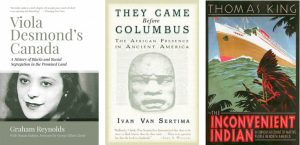Crossing Bathurst Street with A Different Booklist

Itah Sadu says some of the books gracing her new storefront window might include Viola Desmond’s Canada, in honour of the woman who will grace Canada’s new $10 bank note, They Came Before Columbus by Dr. Ivan Van Sertima, as a reminder of how deep African roots in North America truly run, and something by Thomas King or Sherman Alexie, so that “we are mindful too while we are having conversations about our roots in Canada, that we are also standing in the land of our Native brothers and sisters”.
By Annemarie Brissenden
The Postman, a 2015 play about Albert Jackson, Canada’s first Black postman, opens with an invocation.
“Toronto the Good. Toronto, the White. Toronto the Christian, Irish, Scottish, English. This is happening right here in this neighbourhood: Harbord, Major, Palmerston, Brunswick, Euclid, Borden,” says Jackson. “Good solid White names. No ‘Albert Jackson Lane’ then, I can assure you. These are the rivers I crossed every day. Downtown further, Queen and Broadview, country then — city now, there’s a sign on a bridge today says: The River I Step In is Not the River I Stand In.”
Performed in the Annex from the very porches he delivered mail to, from the very place he called home, the play invites the audience to cross times as it relates the story of barriers crossed and miles were walked.
“We are a community of people who have crossed over so many things, important things before,” explains Itah Sadu, wanting to underscore the importance of crossing over for the Black community.
Earlier this month, A Different Booklist, the bookstore she owns with husband Miguel San Vicente, relocated to a new location to make way for the Mirvish Village redevelopment. An army of volunteer helpers supported the move, creating a parade of patrons crossing Bathurst Street toting boxes of books on Feb. 4.
“It is exciting that we could have a movement, an extended family of people involved in this movement of people,” says Sadu, adding that the backyard is the only thing she’ll miss about the old place. “We had the coolest backyard ever. We called it the island. We’ll miss the opportunity to be outdoors, ‘on the island’ with a little flavour of back home.”
The bookstore will remain in the area, just across the street in fact, a cultural marker of a time when the neighbourhood was known as “Blackhurst” for the concentration of Afro-Caribbean stores and restaurants serving the Black families that lived nearby.
“At one time, Jewish people rented houses to us because nobody else would,” Sadu says. “There’s a rich legacy of people of colour in the Annex: Rosemary Brown, Stanley Grizzle, Austin Clark, Albert Jackson. A lot of people who opened doors; we have to keep those doors open, so people can keep walking through.”
Sadu is a careful custodian of that legacy. She curates historical walks along Bathurst Street, and reaches out to students in the local high schools. And she and Miguel San Vicente were awarded the Premier’s Award for Excellence in the Arts last October.
“A Different Booklist has been a remarkable contributor to our cultural tapestry, bringing people together and celebrating literature from African-Canadian and Caribbean writers,” said Eleanor McMahon, the provincial minister of tourism, culture and sport, in an email. “Because of leaders like Miguel San Vicente and Ita Sadu, our youth are able to better explore multiculturalism and Toronto benefits from having a meeting point where generations and ideas intersect freely.”
Sadu says she was both humbled and proud to receive the award.
“When I looked around the room, I saw the cultural industries of Ontario. And to be in the society of those institutions is not something we took lightly. It’s an honour to know the tentacle and outreach of the bookstore has extended far and wide from Bathurst and Bloor [streets].”
She also tells a story that illustrates how there is still work to be done in crossing divides.
“When we came in, the security guard asked us for an invitation. He didn’t ask anyone else,” Sadu says. “Then for us to emerge as a winner. Maybe we are supposed to be in the room. We don’t need an invitation to the party.”
Reflecting on the moment, she references American activist and writer bell hooks, who wrote of having to move from the margin to the centre.
“We have moved to the centre.”
